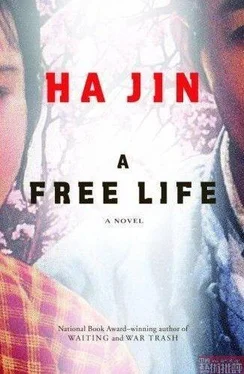"Why should I lie to you?" She sounded a little cheerful now. " How much did he get for his kidney?" "Twenty-five thousand dollars."
"I knew his parents often demanded he send them remittances, but I couldn't imagine he'd sell his own organ."
"He's a typical 'small man' and couldn't survive in America. A born coward."
"Still, it must've taken a lot of guts to sell a kidney." Yafang cackled. " Nan, you haven't lost your sense of deadpan humor."
Her remark puzzled Nan, who hadn't meant to be funny at all. In fact, the conversation saddened him. However, the relative she had mentioned turned out to be helpful. Yafang's cousin, Shubo Gao, happened to be a Ph.D. candidate at the University of Georgia and lived near Lawrenceville. He answered Nan's call and let his wife, Niyan, speak with Nan. She was very eager to take the job and said she was tired of living idly at home. The next day she came to the Gold Wok, accompanied by her husband. Pingping liked Niyan, who was in her late twenties and quite good-looking, with a button nose, long-lashed eyes, and an oval face. So the Wus hired her and she started to work two days later. Niyan knew English, though she sounded as if she were giving a spiel when she spoke to customers, making little distinction between the long and the short vowels. But the Wus were pleased to have her, and things were normal again at the Gold Wok.
For days Nan thought about the phrase Yafang had used on the phone-"small man"-which was a faddish term that appeared in the Chinese-language newspapers and magazines published in the diaspora. It had been coined a few months earlier by a woman in a scathing article entitled "Let Us Condemn Small Men." She criticized some male Chinese immigrants who, having encased themselves in the past, made no effort to blend into American society. According to her, these "spineless men," unable to adapt to the life here, would vent their spleen on their wives and girlfriends and blame America for their own failure. Under the pretext of patriotism and preserving Chinese culture, they'd refuse to learn anything from other cultures. To them, even American salt was not as salty as Chinese salt. All they knew about America was strip bars, casinos, prostitutes, MBAs, CEOs; they had no friends of other races and refused to learn English. They were like crabs trapped in a vat, striving against one another, but none could get out of it. Some of them, who had lived in this country for more than a decade, still couldn't understand movies like Rain Man, Dances with Wolves, and Peter Pan. They had never visited a museum, and neither would they travel to see Europe or Latin America. They didn't know how many innings a baseball game had. They had no idea who Elvis Presley was, not to mention an appreciation of his music; they couldn't tell jazz from rock, or country from gospel; whenever they got homesick, they'd sing revolutionary songs, and their number one choice was "The Internationale." Still, they believed they were geniuses hamstrung by misfortunes and stunted by the emigration, as if there were no other people in the world who suffered more than they. By nature most Chinese women in America didn't aspire to be strong women, but their small men forced them to be more responsible and play the role of both wife and husband. It was common sense that when yang was weak, yin would have to grow stronger and prevail. "These small men can be a scourge of your bodies and minds," the author concluded. "Sisters, let us shun them if we cannot change or get rid of them."
Since the publication of that vociferous article in the Global Weekly, there had been heated discussion of the topic. A lot of men were outraged, saying the author, as a compatriot of theirs, should at least have some sympathy for them. They had already been mentally dwarfed and socially handicapped by living in America and by the tremendous struggle they had to wage for survival, so they didn't need her sort of twaddle, which just gave them more stress. Several meetings were held in American and Australian cities to debate the author's views. Many men wrote articles condemning her as a traitor, "a mere banana"-yellow on the outside and white on the inside.
Nan had seen that some of the men had indeed grown feeble and trivial, yet they were all the more megalomaniac. As for himself, he felt he was a better man than before. On the other hand, he knew that most of the labeled men were lonely souls who suffered intensely here. It was said that if a foreigner or immigrant lived in America for five years without family or close friends, the person would develop emotional problems. If one lived here for ten years isolated like that, one would have a mental disorder.
Nowadays it was commonplace for a woman to insult a Chinese man by calling him a "small man." That meant the fellow was a hopeless loser all women should hold in contempt.
JANET came and told Pingping that Dave and she had decided to adopt a baby, but that they'd have to wait three or four months before they could get a definite answer from the orphanage in Nanjing. The waiting list was long because lately a lot of American couples had begun to adopt Chinese babies and thus overwhelmed the adoption system there. In the Mitchells' case, Janet and Dave weren't sure whether they should continue to work with their agent or find another way to get a baby sooner. Janet asked Pingping, "Do you have a friend or relative who lives in Nanjing or nearby?"
"I have a cousin in Nantong, in same province. But we are never close because he betray my father in Cultural Revolution to protect himself. He just want to join Communist Party. Why you ask?"
"Dave and I wonder if we can find someone in China who can help us adopt a baby quickly. The regular process will take forever."
"I can ask my cousin, but I don't trust him. Let Nan and I think about this, okay?"
"Sure. If you can help us find some inside connections, that'll make the whole thing easier."
Nan put in, "How much does an agent cawst?"
"Ten thousand at most. We paid three thousand up front."
"If I were you, I'd use zee agent instead of depending on personal pull, as long as your agent has a good reputation."
"Why? Don't most people use personal connections to get things done in China?"
"Yes, but you may end up paying more zan you pay zee agent, and there will be endless anxiety. Any petty awfficial can interfere and create trahble for you. Zee awfficial world in China is like a black hole, and few people can keep their bearings once they're sucked into it. Besides, your connections in China will have to bribe awffi-cials at every turn. You will pay for zer horrendous bribes, right?"
"I guess so. But we've been thinking of doing this both ways, using our agent and the inside connections at the same time."
"No, you should rely on your agent only."
" Nan has point," Pingping said. "There's a lotta trouble if you involve officials."
So the Mitchells continued working with a Chinese American woman based in San Francisco, who had successfully helped dozens of families adopt babies. Janet showed the agency's literature to Pingping and Nan, who both felt the woman was trustworthy. Ping-ping even talked to her on behalf of the Mitchells, saying they had been her friends for a long time and were a reliable, loving couple, who had just built their dream home, a big Victorian house in an affluent neighborhood. She also mentioned they would become Tao-tao's guardians should she and her husband die by accident. The agent, named Ruhua, was impressed and said in her Mandarin roughened by Cantonese, "Thank you for the information. That's very helpful. I'm going to schedule a home study of the Mitchells."
"You mean you'll come here?"
"Oh no, I'll contact a local person, a certified social worker, who will go interview Dave and Janet and make sure they're a responsible couple and financially capable of supporting a child. Also, they must have no history of child abuse and substance abuse. Both the INS and the Chinese side demand the information."
Читать дальше












